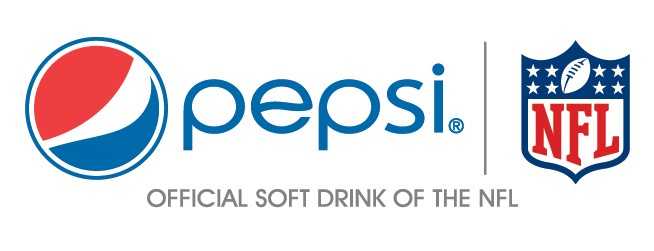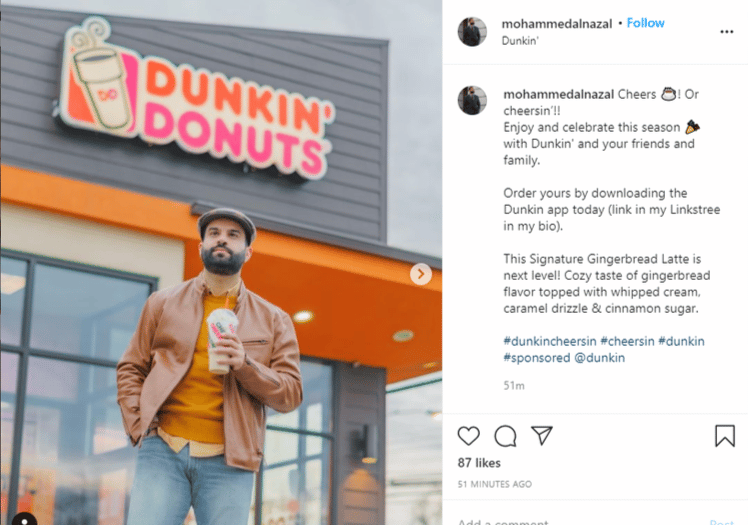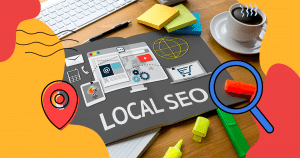As a business, it is all about the steps you can take to improve your brand awareness and overall image.
If people don’t know you exist, you simply cannot expect your brand to grow.
This is where all forms of digital marketing come into play, such as sponsorship marketing.
It allows you to increase your reputation by working side-by-side with other successful and prominent brands.
If you’re looking to grow quickly while reaching your targeted audience, then sponsorship marketing may be the way to go.
Keep reading and we’ll share insight into what it is, the benefits of this form of marketing, and how to get started with your own sponsorship marketing plan.
- What is Sponsorship Marketing?
- What are the 4 Types of Sponsorship? With Examples
- Benefits of Sponsorship Marketing
- How to Add Sponsorship to Your Marketing Plan
- Wrap Up
What is Sponsorship Marketing?
Many people do not realize that sponsorship is a specific type of marketing. It can be used by numerous businesses to get a leg up on the competition in the marketplace.
As a general rule, sponsorship marketing occurs when two brands decide to work together professionally.
Basically, one brand will sponsor the other brand in some form, such as resources, funding, or services.
Some examples of sponsorship marketing include:
- Charity events
- Performances
- Sporting events
The sponsoring brand will offer their support, and in return, the non-sponsoring brand will achieve a boost in their brand awareness, reputation, and the like.
It is important to understand that sponsorship marketing is not directly promoting your brand, products, etc. This means it is not a form of advertising.
Instead, the sponsoring company is paying to support a pre-determined event that will interest your customers.
As a result, your brand will be associated with said event through event attendees, customers, and the media.
What are the 4 Types of Sponsorship? With Examples
Ultimately, there are two primary forms of sponsorship: financial and in-kind. Each has its own benefits.
1. Financial Sponsorship
Financial sponsorship is commonly referred to as a cash sponsor. This is definitely the most popular and common type of sponsorship.
The sponsor gives money to the beneficiary in return for promotion (or other services).
Financial sponsorship examples
A popular example of a financial sponsorship is between PepsiCo and the NFL.
PepsiCo sponsored the Super Bowl halftime show, allowing the NFL to expand the show and reach a wider audience.
In return, PepsiCo promoted its own products to a broader audience.
Another example of financial sponsorship is the cause-related support provided by American Express to the Charge Against Hunger campaign.
Every time a customer used their card to make a purchase, American Express responded by making a donation to the campaign.

There are different levels of financial sponsorship, which include:
Series Sponsor
This is the highest level of sponsorship and will include the name and logo of the sponsor in the title of the event series, not to mention other benefits like access to team information to use to their advantage, stadium branding, and more.
Title Sponsor
This is very much like the series sponsor except it is for a single event.
General Sponsors
This type of sponsor has the right to promote their unique association as a sponsor and will often benefit from press coverage.
Team Sponsor
This is a sponsor that funds individual teams. They typically receive a mention throughout the media coverage and have their logo on the team uniforms.
Official Sponsor
This type of sponsor tends to take a certain percentage of the raised funds from the event. An example of this is “an official insurance partner of the Chicago Cubs”.
Participating Sponsors
These are sponsors that don’t have as many benefits as the sponsors mentioned above. Generally, the fee isn’t larger than 10% of the raised funds.
2. In-Kind Sponsorship
An in-kind sponsorship is a unique type of sponsorship in which the sponsor will agree to offer products or services in place of cash.
In-Kind sponsorship examples
In an effort to gain brand recognition and reach a wider audience, Hallmark Cards Inc. sponsored the U.S. Olympic Team in the Salt Lake City winter games.
It did so by providing valuable printing services that cut costs dramatically.
Hilton took their in-kind sponsorship in a different direction, teaming up with Live Nation and its ticketing arm, Ticketmaster.
Both benefited from this sponsorship, with Hilton members being able to use their HHonors points to obtain tickets to events through Live Nation.
Live Nation features Hilton hotel rooms on the website once a guest purchases tickets, providing additional exposure to the brand.
In addition, Live Nation executives and artists receive discounted hotel room rates.
Here is a look at the varying levels of in-kind sponsorship.
Venue Partners
This type of sponsor will host events at their own venue for a discounted rate or free of charge.
Prize Sponsors
This sponsor will donate certain items from their company to the event, including items for an auction, prizes for activities, and more.
Food Sponsors
This type of sponsor will offer free food to the event attendees.
Digital Sponsors
This sponsor may offer live streaming of the event or a custom event app.
Media Sponsorship
This type of sponsor will offer a variety of marketing for the event.
Technical Sponsor
This sponsor offers products or services to a team or event, such as equipment, supplements, skills, etc.
3.
Media event sponsorship
Media event sponsorship involves the promotion of an event or activity of another entity, organization, or individual and is a form of an in-kind sponsorship.
Common ways the promotion occurs is through social media postings, YouTube videos, blog post publishing, and information sharing by way of broadcasting over the local television network.
Examples of media event sponsorships
Coca-Cola collaborated with the 2016 Olympic games in Rio with a #ThatsGold social media platform campaign meant to capture the attention of teenagers.
The campaign ran prior to the commencement of the games and also during and after, using photos and videos with athletes, musicians, and more.
Another example is the insurance company, Esurance, and how it became more active on social media as a sponsor of the South by Southwest Conference & Festivals (SXSW), a big creative industry event held each year.
Esurance held contests at the event as well as being a sponsor, and both of these resulted in higher participation with its brand.

4. Promotional Partners
Promotional partner sponsorships involve the promotion of an event, brand, product, or service, usually by a well-known individual, such as a social media influencer or blogger.
The promotion can occur across various platforms and in a variety of ways.
The promoters themselves may receive something in return, such as a speaking spot in an upcoming event.
Examples of promotional partners
Instagram influencer Mohammed Al Nazal teamed up with the Dunkin’ Donuts brand to promote a signature beverage, the gingerbread latte.
The influencer posted a selfie with the Dunkin’ Donuts sign looming large in the background, with captions encouraging followers to download the brand’s app so they could easily place orders.

As a way to promote their game app, Panda Pop worked with partner Jamerill Stewart. Stewart has a popular YouTube channel that caters to helping mothers with larger families plan and cooks meals.
In her videos, she features the plush Panda Pop pandas in the background as she cooks and also shows a clip of herself relaxing while playing the video game.
Stewart encourages her numerous viewers to use the Panda Pop game as a way to relieve the accumulating stress that comes with being a mom and being responsible for so much.
Benefits of Sponsorship Marketing
Sponsorship works in a special way that offers benefits to both the sponsor and the beneficiary.
This type of marketing is quickly replacing traditional forms of funding and advertising. But what are the benefits?
Here is a look at a few of them.
1. Increased Brand Visibility
With a sponsorship, your brand is placed directly in front of vast audiences who may not be familiar with your business.
Basically, the larger the event, the more social media mentions and press you will get before, throughout, and following the day of the event.
In the case of many sponsorships, you will have access to featured advertisements, radio spots, and/or signs that will increase brand recognition ahead of the event.
If you plan to offer promotional items or giveaways, then many people at the event will be carrying around your swag, displaying and advertising your brand for you.
When selecting events to align with, make sure that you have done your research and the event has a good track record of attracting both quality customers and the press.
2. Efficient Lead Generation
The great thing about sponsorship marketing is that these events will bring the right customers to you while also allowing you the chance to show your brand’s human side.
Emotional connections are necessary to build sufficient brand loyalty.
By attending an in-person event, you will promote your products, learn about your customers, and create a mailing list of qualified leads.
3. Improved Consumer Perception
If your storefront doesn’t look great and isn’t filled with customers, others aren’t likely to be interested in checking your store out and spending any amount of time there.
For eCommerce sites, when there are no business details, solid branding, or security certificates, online shoppers are turned off.
Public perception is essential in growing your business and ensuring you have a business to even grow. It is literally a make-or-break aspect of running a business.
Positive opinions of your business are formed by customers when you are connected to a high-profile event.
Consumers will automatically assume that your company is reliable, trustworthy, and reputable if you are in sponsorship with other businesses.
Boosted Sales
No matter how much research and effort you put into reaching consumers today, traditional marketing and advertising don’t go as far as they once did.
Each minute that goes by, conventional tactics aren’t as effective thanks to improvements in technology like ad-blocking software.
Consumers not only want to be engaged by brands, but they also want to feel truly connected to them.
This is one of the many reasons why event sponsorship can be so effective at generating new leads and driving sales.
The better the connection is with consumers, the more likely it is that they will make an initial purchase and become loyal.
4. Enhanced Content Marketing
Sponsorships offer an opportunity for fresh material that can help expand your current content marketing campaign.
After all, there will be pre-event promotions, follow-up blogs, and more regarding the event itself.
Further, when an event attendee tags a photo from the event or posts a comment on a photo related to the event, you are instantly exposed to their entire network of friends and colleagues.
So, with that being said, it is imperative you take advantage of each and every content-related opportunity that comes your way in relation to the sponsorship.
For instance, post videos of presentations, blog about keynote speakers, post photos from the event, share presentation decks, and more.
Don’t forget to also engage with attendees when they make posts, especially if they mention your brand.
5. High Return on Investment
Regardless of whether your intention is to sell your products or services at the event, you can begin to form quality relationships with consumers.
Ultimately, your goal is to leave the event with a list of qualified leads that you can follow up with afterward.
So, as long as you are getting those leads, you don’t need to have skyrocketing sales at the event.
These leads will lead to long-term growth, providing you with a high return on investment.
How to Add Sponsorship to Your Marketing Plan
As you’ve learned, sponsorship marketing has the potential to help your company improve its public image, increase its credibility, and build a reputation you can be proud of.
Of course, when adding this type of marketing to your plan, it must be used tactically.
So, as you begin your research into events and what it is that your customers are passionate about, here are a few questions to bring up.
- Have you worked with other sponsors previously?
- If not, is this something that you are open to?
- What type of financial support is expected from sponsors?
- What is the level of exposure that can be reasonably expected based on the level of sponsorship?
Wrap Up
Sponsorship is an incredible marketing tactic that involves a solid business relationship between two individual parties: the sponsor and the beneficiary.
The more you embrace your role, the more benefits you will reap from your efforts.
More often than not, you will find that many sponsorship marketing opportunities will provide you with a higher return on investment than traditional advertising methods.
With the right event, this form of marketing can improve your brand image, increase brand awareness, and offer you a competitive edge.
Looking to build your brand identity? Get started with this Brand Guidelines Bundle!









